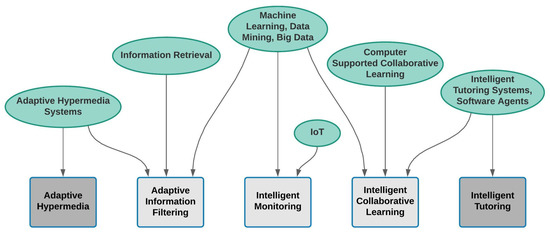Things about Bioinformatics Tutor
Things about Bioinformatics Tutor
Blog Article
The Ultimate Guide To Bioinformatics Tutor
Table of ContentsThe 5-Minute Rule for Bioinformatics TutorBioinformatics Tutor Things To Know Before You Get This6 Simple Techniques For Bioinformatics TutorBioinformatics Tutor Fundamentals ExplainedBioinformatics Tutor - The Facts
Of the overall individuals associated with the training, 80% were students from public higher education and learning institutions, while the continuing to be 20% came from exclusive establishments. To get approved for a certificate of involvement, trainees were called for to participate in a minimum of 90% of the complete training hours. As a result of this requirement, an impressive 95% of the individuals efficiently obtained their certificates, having not only met the minimum attendance requirements yet also completed all assigned activities throughout the training.
During the height of the COVID-19 pandemic, particularly between June and August 2020, the job group was entrusted with arranging specialized training in bioinformatics. This training was particularly focused on pupils from the research group Nucleus for Research study in Applied Computing at the Federal College of Pará (UFRA) The adjustment to remote discovering platforms because of the pandemic developed an opportunity to check out brand-new teaching methodologies and electronic devices that improved both reach and efficiency.
This program was developed to provide an available yet extensive summary of Artificial Knowledge methods, particularly as applied in bioinformatics (Bioinformatics Tutor). This virtual format allowed engagement from trainees across Brazil, numerous of whom could not have had the opportunity to participate in in-person sessions.
The Main Principles Of Bioinformatics Tutor
Roughly 50% of the total training hours were devoted to practical activities where trainees developed smart designs and applications in a variety of scientific domain names, including genes, molecular biology, and environmental data analysis. These systems allowed pupils to engage in real-time data control, model training, and algorithm experimentation.
The program attracted 80 individuals in total amount. Sixty of them were connected with different higher education establishments in the state of Pará, while the remaining twenty came from establishments situated in 5 other Brazilian states. This wide geographical representation highlighted the nationwide passion in bioinformatics and the expanding demand for specialized skills in this field. By introducing Expert system in a practical and relevant context, the initiative served to link the gap between theory and real-world application, offering trainees with a solid structure for future research or employment in the area.
The training effort formed component of a wider scholastic outreach effort referred to as the Bioinformatics when traveling project. This project has, over the years, presented lots of pupils to the world of bioinformatics and computational biology. The events held under this umbrella initiative have actually happened throughout multiple regions and years, as summed up in Table 1 (Checklist of events, areas, years, and overall numbers of students and teachers)
Several of these groups, originally brought together by their involvement in training occasions, have actually given that gone on to generate independent clinical research in collaboration with local academic institutions. The training not only fostered clinical reasoning within the context of bioinformatics yet additionally triggered collective connections that prolonged beyond the training atmosphere.
Bioinformatics Tutor Fundamentals Explained
The task itself was conceived and organized by megabytes and RR, who supervised the planning and execution of each step. Lectures were delivered by a multidisciplinary group including MB, FA, EF, KP, JS, DM, SN, LP, LG, RR, ih, and a/c. The same group, omitting IH and RR, also worked as tutors for the sensible training modules. Financing for the job was offered via the grant 88887.200562/ 2018-00 from CAPES. The writers prolong their appreciation to everyone that added to the awareness of this job, whether straight or indirectly, given that its creation.
The Federal University of Pará's Workplace of Research study (PROPESP/UFPA) also supplied economic support, particularly for the manufacturing of the last manuscript. The writers proclaim no industrial or economic problems of rate of interest that could have affected the research. All analyses and opinions shared in this article are entirely those of the authors and do not always mirror those of their particular establishments, the publisher, editors, or reviewers involved in the publication process.

Excitement About Bioinformatics Tutor
From a pedagogical perspective, the teaching technique used in the training was intentionally interactive. Classes were conducted in a manner that encouraged pupil involvement and discussion, surpassing rote memorization to check out just how ideas are developed, used in life, and examined in scholastic settings. The training ideology concentrated on supporting both solid and having a hard time students, web link giving personalized support, and building self-confidence with continual mentorship and persistence.

Each group, being composed of about 36 individuals, was supported by three advisors-- many of whom were postdoctoral researchers with specialized know-how. These coaches not only helped make the group projects yet additionally facilitated their execution, making certain that each study concern was both suitably tough and pertinent. The objective was to see page provide a naturally reasonable context that participants might explore via open-ended purposes and access to curated datasets.
For added insights right into the method and outcomes of this project-based learning strategy, readers are routed to S1 Text, which includes thorough summaries of the pedagogical framework, evaluation methods, and project styles made use of in the training sessions.
The Buzz on Bioinformatics Tutor
Of the overall participants involved in the training, 80% were trainees from public higher education institutions, while the staying 20% came from private establishments. To certify for a certificate of engagement, pupils were needed to participate in at the very least 90% of the complete training hours. Significantly, past the pupils that enrolled in the training sessions, 7 skilled trainers took part in providing the programs, while 3 specialized study teachers worked with the total training procedure. About 50% of the complete training hours were committed to sensible tasks where pupils constructed you can look here smart designs and applications in a variety of scientific domains, including genetics, molecular biology, and ecological information evaluation. The training not only fostered scientific reasoning within the context of bioinformatics yet additionally triggered collective relationships that prolonged beyond the training environment.
Report this page